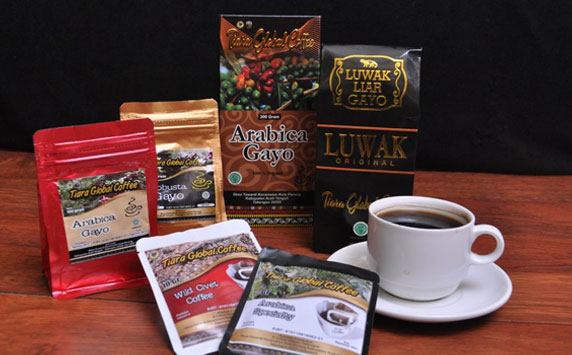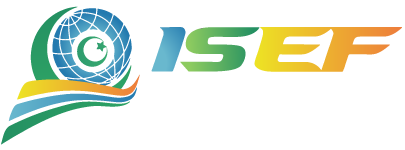ACEH – Arabika Gayo Aceh
Bawadi Coffee is a producer of high-grade arabica coffee from the Gayo highlands. Located in the mountainous central part of Aceh province, the Gayo highlands stands as one of the finest coffee plantations in the world at more than 1400 meters above sea level. Bawadi’s Gayo Aceh coffee beans are organically grown with zero preservatives and known for its spicy, acidic flavor. Bawadi Coffee began as a home industry in 2014 with just five local farmers. The company grew significantly in 2019 after joining forces with a coffee farmers cooperative that owned an acre-wide plantation with over 1200 farmers. This expansion now gives Bawadi the capacity to produce between 810-1000 tons of coffee per year. Aside from having its coffee marketed in several chain supermarkets and mini-markets in Indonesia, Bawadi Coffee also caters to coffee aficionados in Malaysia, Thailand, Brunei, China and Singapore
ACEH – Arabika Gayo Lhokseumawe

Tiara Global Coffee (TGC) is another major coffee producer from the Gayo highlands, offering arabica specialty coffee, kopi luwak and wine coffee since 2008. Even before artisan coffee became a global trend, TGC owner Jemalin — a coffee farmer and entrepreneur — believed that the Indonesian coffee market still had plenty of room for growth and that Gayo coffee would eventually satisfy the taste buds of coffee enthusiasts around the world. His predictions on the global shift in taste for coffee proved correct. Since 2015, TGC’s turnover grew at a rate of 200 percent per year. Each month TGC sells between two to four tons of coffee to domestic and foreign markets, with regular buyers in South Korea, Japan, Taiwan and periodic buyers in such countries as the US, China, Turkey and the UAE
BALI – Arabika Kintamani
Bali Arabica is made in the villages of Belantih and Ulian in the Kintamani highlands, between the volcanoes of Mount Batukaru and Mount Agung. The highlands’ climate and rich volcanic soil are ideal for coffee cultivation, especially with Bali Arabica’s plantations standing 1200 meters above sea level. The result is a coffee known for its fruity, chocolatey flavor and lower caffeine content. Established in 2013, Bali Arabica founder I Komang Sukarsana had a mission to create fair trade conditions for local coffee farmers who had long been cheated by middlemen, and also educate local communities about sustainability practices and quality control. By doing so, entire village communities now earn their living through the coffee value chain. Bali Arabica coffee can be found in cafes, restaurants and hotels across the country and overseas, thanks to partnerships with online platforms like AirBnB, Klook, Cookly and Wandure. Coffee enthusiasts visiting the Kintamani highlands can also go on special “coffee tours” curated by Bali Arabica.
JEMBER – Robusta Sidomulyo
KSU Buah Ketakasi is a coffee farmers’ cooperative from Sidomulyo village that produces a blend of Robusta coffee indigenous to that village. Sidomulyo village is situated in a mountainous region bordering the districts of Jember and Banyuwangi, about 500-1000 meters above sea-level with average temperatures of 21 degrees celsius. KSU Buah Ketakasi was established in 2007 with the commitment to continuously improve the quality and output of Robusta coffee plants through several strategic partnerships, including with the Indonesia Coffee and Cocoa Research Institute, a coffee exporting company, as well as the state universities of Jember and Malang.
KERINCI – Arabica Koerintji
Saga Coffee Arabica Koerintji, named after its district of origin in Jambi province, was born out of a desire to create fair trade conditions for coffee farmers in Kerinci. At first, the Robbani Foundation in Kerinci set out to improve the village economy of local coffee farmers by buying their ripe coffee cherries. In 2017, the Robbani Foundation established the Robbani Coffee Clinic in collaboration with fifteen coffee farmers on a ten acre plantatio, producing over 10,000 tons of coffee cherries each year. The end-result of this endeavor was the Arabica Kerinci specialty green bean, grown from the Kerinci highlands. Robbani Coffee is now working with several coffee processing companies to market the coffee to several major cities in Sumatra island under the brand “Kopi Robbani”. Once it manages to reach every major city in Indonesia, Robbani Coffee will go international.
LAMPUNG – Luwak Robusta Lampung
Ratu Luwak, which means “Luwak Queen”, hails from Lampung province in Sumatra island. The brand was named after Sri Wiyatmi, a civet breeder credited as being the first woman to produce the infamous kopi luwak in Lampung. Hence, “Luwak Queen”. Kopi Luwak is one of the most expensive coffees in the world, fetching a price of around $100 per kilogram, and with good reason: civets are rare creatures in Indonesia and have even gone extinct in other parts of Asia. Breeding civets can cost thousands of dollars per year, but it’s a worthy investment for breeders since civets have the ability to sniff out high quality coffee cherries and feast on them. The flesh of the coffee cherries are removed during the digestive process, but the coffee beans inside the cherries are not digested. The natural enzymes in the civet’s intestines helps reduce the beans acidity, caffeine levels and total protein — resulting in a smooth tasting coffee with high aroma and low bitterness.
MALANG – Arabika Lereng Gunung Arjuno
Kopi Sumadi is a producer of quality arabica coffee, grown atop Elang Hill in the valleys of the volcanic Mount Arjuno, East Java, 1350 meters above sea-level. The coffee is grown organically with an eye towards environmental sustainability. In fact just a few years ago Mount Arjuna was almost stripped bare by illegal loggers. Kopi Sumadi led a complete reforestation effort in Elang Hill, encouraging the local village community to cultivate coffee as a means of earning a livelihood, and making the hill lush again with the green of the coffee plants, sheltered and shaded by larger trees. Through outreach and education, the loggers that once destroyed the forests of Elang Hill for money are now also making a living through coffee cultivation and understand the importance of environmental conservation for future generations. With every sip of Kopi Sumadi coffee, you are contributing to environmental conservation, reforestation and the village economy of the local coffee farmers.
NORTH SUMATRA – Arabika Sipirok
PDM Coffee (Pesantren Darul Mursyid Coffee) produces a unique blend of Sumatran coffee known as Arabica Sipirok coffee, named after its district of origin in Tapanuli, North Sumatra, and is cultivated at an altitude between 900-1400 meters above sea level. Arabica Sipirok coffee can be processed using the dry-hull method, creating an herbal, caramel, lemon-infused flavor, or wet-hull technique which gives off a more herbal, caramel, floral taste. PDM Coffee began in 2016 as a business unit of the Darul Mursyid islamic boarding school or pesantren in South Tapanuli. Generally speaking, establishing a business unit gives a pesantren the autonomy to raise funds for educational facilities. In the case of PDM Coffee, students are also working to strengthen the local economy by giving coffee farmers the knowledge and motivation to produce coffee in a more professional manner.
NORTH SUMATRA – Arabika Mandailing
Lopo Mandheling Coffee (LMC) is a producer of premium arabica coffee, cultivated in the Mandailing coffee plantations of the Barisan Mountains, situated 1400 meters above sea-level and home to 35 active volcanoes, creating ideal soil and climate conditions for coffee bean growth. LMC employs the traditional Mandailing method of semi-washed processing, resulting in a medium-bodied coffee with a fruity flavor, colored with hints of caramel brown sugar, ginger dan cinnamon. LMC began in 2014 with a mission to reintroduce coffee lovers to the distinct taste of Mandailing coffee. Working with two local coffee farming groups to get the best beans, LMC regularly educates coffee farmers on cultivation methods to continuously improve output.
PAPUA – Arabika Papua
Saga Coffee Arabica Papua is among a wide range of Indonesian coffee products provided by the Jakarta based Saga Coffee company. Arabica Papua was first cultivated in 1968 by the Suku Mee tribe in the central mountains of Papua, at an altitude of 1700 meters above sea-level. It was more intensively cultivated in the Papun village of Modio, and thus is also known as Modio coffee. An organic coffee, Arabica Papua has traditionally been cultivated without fertilizers and pesticides. Arabica Papua is characterized as a bold coffee with a sweet, winey, caramelized dark chocolate taste.
SOUTH KALIMANTAN-Liberica Bati-Bati
Biji Kopi Borneo (BKB) began in 2018 with the ambition of reaching an ever-growing audience of Indonesian (and global) coffee lovers that remain largely unaware of the wonders of South Kalimantan coffee. Even South Kalimantan locals are said to be unaware that their home province is a producer of liberica coffee — one of the most expensive types of coffee — and top quality robusta. BKB’s liberica coffee is grown in the peatlands of Nusa Indah village in the district of Tanah Laut. Known as a light-medium bodied coffee ideal for espressos, BKB’s liberica has been showcased at the Helsinki Coffee Festival: the biggest international coffee festival in the Nordics. BKB’s robusta blend has a chocolatey, cinnamon taste different from other robusta coffees and is grown in the fertile soils of the volcanic Meratus range, 300-500 meters above sea-level. Aside from wanting to bring South Kalimantan coffee to the world, BKB also has an ambition to introduce a greener economy to the province long known for its environmentally hazardous coal-mining activities.
SOUTH SULAWESI – Luwak Arabika
Kopi Luwak Malino (KLM) is a premium blend of kopi luwak made in the town of Malino, about 2 hours away from the provincial capital of Makassar, which is well-known for its variety of plantations. What makes KLM a “premium” kopi luwak? Only the ripest and brightest coffee cherries are fed to the civets. The civets are bred in captivity to ensure health and nutrition. The civet droppings are then carefully inspected, selected and washed, and only a select few coffee beans will move on to the next processing phase. The civets are owned by Dr. Danny Parmadi, an animal-loving loca dentist who bred civets firstly as a hobby. Dr. Parmadi’s hometown of Malino is perfect for coffee cultivation because it is situated 1500 meters above sea-level and enjoys temperatures of 10-25 degrees celsius all year round. Dr. Parmadi’s first attempt at making kopi luwak was not entirely successful, prompting him to seek training at the Indonesia Coffee and Cocoa Research Institute. After perfecting his technique, Dr. Parmadi began marketing his kopi luwak under the KLM brand in 2011. Characterized as a medium-to-heavy bodied coffee with a sweet aftertaste, KLM now has a market in China, Hong Kong and South Korea.
TASIKMALAYA – Arabika Cigalontang
Kopi Cigalontang is a treasure of the West Java mountain range: premium arabica coffee grown atop Mount Raja, 1200 meters above sea-level, nearby the volcanic Mount Galunggung which last erupted in 1982, creating fertile soil conditions perfect for growing arabica coffee beans. The beans are hand-picked by the Cigalontong district farming community on a 200 acre coffee plantation that produces three arabica coffee variants: Sigararutang, Lini S and Java Preanger. Farmers pick and choose only the best ripe coffee cherries, which create a more fragrant coffee aroma and taste. Kopi Cigalontang is purely organic with zero additives and preservatives, and processed using natural, fullwash, honey and wine techniques. Beyond its locale, Kopi Cigalontang is marketed to Jakarta, Bandung, Yogyakarta and several other major cities in Indonesia, and has even crossed international borders to Taiwan.
WEST JAVA – Arabica Collective Full Washed
Frisa Agrolestari/Java Frinsa Estate grows its arabica coffee in the highlands of Mount Tilu, South Bandung, nearby the Wayang Windu volcano, on a plantation 1750 meters above sea level. The 150 acre estate is run by ex-potato farmer Wildan Mustofa. Although he was doing great business exporting potatoes, in 2011 Mustofa and his partner switched to cultivating coffee as a commitment to environmental protection and sustainability. Frinsa believes that sustainable incomes breed sustainable business. Much time and effort is invested to empowering and building the capacity of local coffee farmers. The company strikes a balance between maintaining tradition and continuous R&D, leading to the creation of ten different specialty coffees so far. In response to growing global demand for environmentally responsibility, Frinsa employs only the most organic and eco-friendly methods of producing coffee. In turn, major international coffee markets have been very welcoming, with exports reaching a number of EU countries, the US and Australia.
East Nusa Tenggara – Arabica Flores Bajawa
Flores Bajawa arabica coffee is cultivated in the Ngada Highlands of Flores Island at an altitude of 1000-1500 meters above sea-level, resulting in a fruity, floral tasting blend of arabica. In 2012, the Ministry of Law and Human Rights protected Flores Bajawa coffee with Geographical Indication, marking its 6500 acre-wide plantation. Local coffee farmers produce 6500 tons of green beans per year, with an eye towards export quality. Flores Bajawa is a specialty coffee that meets international organic standards, as recognized by the Indonesian Organic Farming Certification body.
West Java – Arabica Java Signature
According the entry history of Coffee arabica to Indonesia, coffee that are planted and grown on the island of Java is very diverse. Our farmers managed to do rejuvenation, cultivation, and maintenance of a particular varieties type of Coffea arabica.
Java Signature is a high quality specialty arabica coffee organically cultivated in West Java, with a fruity taste and sweet aroma. Ripe coffee cherries are harvested and professionally processed in a hygienic, eco-friendly facility.
JAVARA-Arabica Bedhaya
Arabica Bedhaya
From Panawuan Village in West Java and Buntu Lenta Village in South Sulawesi, we bring you this arabica houseblend coffee resulted from coffee plantations that implement sustainable farming. The practice helps the surrounding environment appear greener with a variety of trees and plants. This beautiful package is one of Javara and Kopi Konservasi tribute to all coffee farmers. Have a cup of coffee and enjoy its unique taste and aroma.
Healthy & Food Organic


